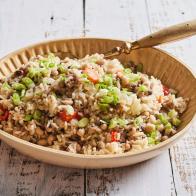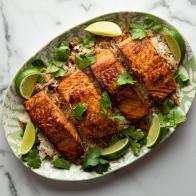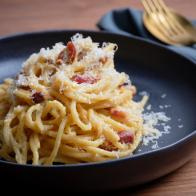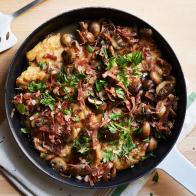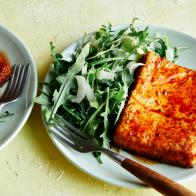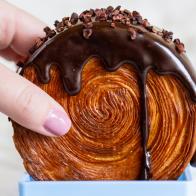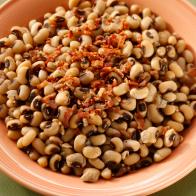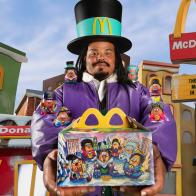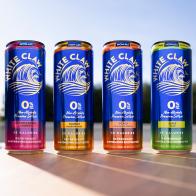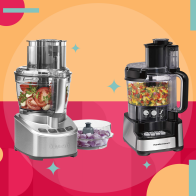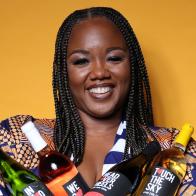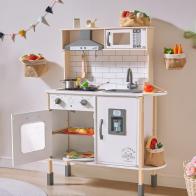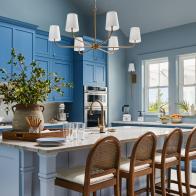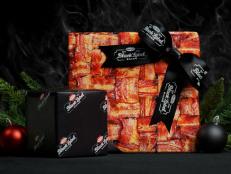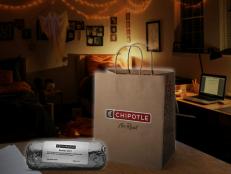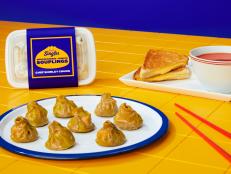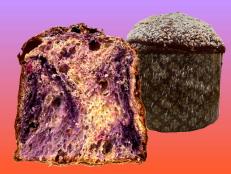This Flan’s Secret Ingredient Is 80 Years of Friendship
Cristi Diez’s grandmother’s best friend’s recipe is special — and might just be the best you’ll ever taste.

Photo courtesy of Cristi Diez
There’s flan, and there’s really good flan. And like many really good recipes, the culinary inspiration behind Brooklyn-based entrepreneur Cristi Diez’s small-batch flan de coco business, Mi Best Friend’s Flan, was handed down from one generation to another — though it took seven decades and a home-cooked, pandemic-era birthday dinner to do so.
Diez’s grandmother Elvira (affectionately called “Wita”) and her best friend Blanca met in their home country of Cuba when they were about 15 years old. Under Castro’s regime, Diez’s grandfather was a political prisoner, so, as many Cubans with relatives outside the country did at the time, Elvira went to live with family in Spain before making it to Miami in the late 1960s where her friend Blanca had already been living for a few years. “Blanca was my grandmother’s everything, she created a soft landing for her in Miami and provided so many resources including emotional support.”
But Mi Best Friend’s Flan was born out of another kind of family reunion. “It was 2020, so we were all in lockdown and didn’t feel comfortable going out to eat. I had gone down to Miami for two months just to spend time with my family while working remotely. They asked me, ‘What do you want to do for your birthday?’ and I said I really just want a home-cooked meal, more specifically a Cuban meal from my grandmother.”
Diez asked Wita to make her favorite Cuban dish, vaca frita de pollo, plus rice, beans and plantains. And for dessert she asked her grandmother to make me a flan. “She understood the assignment and went all out,” Diez says. “And then it was time for dessert and she puts this flan in front of me. Right away, I can tell something is different.”
When asked to explain this variation, Wita replied, “That’s Blanca’s flan.”
With all due deference to her grandmother’s cooking, Diez recalls Blanca’s flan as the best she’d ever had. “My grandmother had her own flan recipe that I had been eating for decades and it’s really good, but it doesn't have that coconut element, it’s a very classic flan de leche.” Diez asked to be taught how to make Blanca’s flan, then, back in New York, Diez adapted the recipe — which, according to Diez, really meant putting specific temperatures and times down on paper to recreate her grandmother and Blanca’s reliable but experience-earned intuition.

Photo courtesy of Cristi Diez
Then, in November of 2022, Diez was laid off from her job as a recruiter in the fin-tech industry. “I was probably giving too much of myself to these companies and I learned the hard lesson that from one moment to the next it all could end.” At that point, Diez was making the flan once in a while, for special occasions and birthdays, but repeated requests for more of the flan — and the urging of friends to start selling them — sparked the idea to bring the recipe to a broader audience. “I thought to myself ‘maybe this could be a serious thing.’ So I started selling to friends and by word of mouth.”
Currently, Mi Best Friend’s Flan is still that purely homegrown business — Diez literally makes and sells the flans to order out of her Bushwick apartment, though she will deliver within the New York City area. Diez offers both large and “mini” flans via email and her Instagram, and hopes the smaller size encourages customers to make flan a more everyday kind of treat.
While the side hustle culture might have us all programmed to expect an inevitable push toward scalability, Diez is taking things at a more organic pace. “I just want the most people possible to try it and then see what it becomes from there.” So far, in addition to handling a few orders per week, Mi Best Friend’s Flan has appeared at pop-up events — including at a local coffee shop featuring flan affogatos. But the idea of supplying a local restaurant with regular orders, or moving into a more industrial kitchen space to meet growing demand is in consideration.
As for the name, Mi Best Friend’s Flan, Diez says it was important that her grandmother and Blanca be incorporated to preserve the story behind the recipe and celebrate those women. And the mix of languages was intentional, too. “I think it’s just cute, the Spanish and English of it all. Spanglish was probably like my first language.”
But if you have strong feelings one way or the other about flan, Diez isn’t surprised. “As someone who is first-generation American — I’m half Cuban and half Spanish, my dad is an immigrant here but mom is an exile — I grew up in Miami, and it’s a very interesting experience because you’re surrounded by people who are like you, so you’re not necessarily forced to assimilate,” Diez recalls. “I didn’t really feel a need or desire to assimilate until I got a bit older, probably in my college years and more so when I moved to San Francisco in my twenties — and that’s a weird experience to go through later in life. It was interesting to see how flan can be a polarizing dessert. But I think for most Hispanic people it’s a very beloved dessert. It’s a staple.” (And, Diez points out, custards like flan are found throughout the cuisines of the Latinx diaspora and beyond, with the name of the dish and ingredients varying by cultural tradition: Spain has crema Catalana, France has creme caramel and leche flan is a common addition to The Philippines’ halo-halo.)
When eating and making Blanca’s flan de coco, Diez says she experiences the usual emotions we associate with homemade sweets. “I feel comfort, I feel joy, I feel all the things you’re supposed to feel when you eat dessert. Someone once told me that dessert is purely for pleasure, savory food is to sustain us but dessert is truly for pleasure.”
But for Diez, sharing this flan represents a deeper connection to and celebration of the bond of best friends. As for Wita and Blanca, “They’re both in their 90s now and they’re still best friends,” Diez says. “They hang out, they talk — they remind me so much of me and my best friend and I think that’s why I find them just so endearing. It’s just female friendship in its purest form. The way that they support and take care of each other is just so unconditional. I’ve always admired their friendship and I think friendships like these need to be celebrated more.”
Speaking of celebrations, flan de coco is a perfect, shareable dessert for the holidays, making appearances at Thanksgiving and Christmas dinner spreads in many households. Its coconut flavor also nods to the Caribbean wintertime quaff coquito.
But not all flans are created equal. Some are made with gelatin or take on a possibly off-putting yellow color. But once you have a good one, Diez says, it’s a “when you know, you know” situation. If you live in New York City, Mi Best Friend’s Flan is, of course, an easy flan-sourcing option. However, if you want to try your hand at this classic custard, here are a few tips for making better flan de coco at home:

Photo courtesy of Cristi Diez
Start with Room Temperature Ingredients
Diez notes that, as with many baked goods, adding ingredients at the proper temperature can make the difference between a dessert that sings or falls flat. For flan, she recommends room-temperature everything, from the eggs, to the condensed and evaporated milks, cream of coconut and vanilla. Cool down the hot caramel syrup as much as possible before lining the bottom of the baking vessel.
Watch Your Caramel’s Color
Making the caramel for a flan is probably the most advanced part of the process, and it can turn people off because it actually can be dangerous if you accidentally touch it. But the bitterness from letting the caramel get slightly darker than the norm provides a bit of balance with the sweet and creaminess.
Use Fresh Eggs
Because flan de coco is relatively light on ingredients (there are just six in Diez’s recipe) good eggs are the one thing you may want to splurge on. “It relies so heavily on the yolk, which gives you that color and richness you want, and that comes from quality eggs.”
Use a Flavorful Cream of Coconut
Diez uses the cream of coconut brand Coco Lopez from a Puerto Rican-founded, Miami-based company. “Coconut desserts often taste very artificial, so I think people love that this coconut flavor is extremely subtle and it adds an interesting depth.”
Bake It Low and Take It Slow
Diez says she bakes her flans at 325 Fahrenheit for about two hours in a bain-marie to get the perfectly silky and set texture. (Diez says “done” for a flan is when it’s registering 185 degrees all the way through the custard.) Baking too hot or too fast can be the culprit when you find your flan has taken what Diez describes as “a Swiss cheese-y vibe” with holes throughout. And that’s only the beginning of the “slow” process, which also includes fully cooling the flan to room temperature (often up to eight hours) before finally putting it into the refrigerator to set.
As Diez points out, the cost of entry to flan de coco is relatively low, but the lengthy process is a labor of love. “It’s just a thing you have to wait to enjoy, but it’s so worth it and it really does make a difference.” To that end, Diez is also more than willing to teach the recipe to friends, partly because it was handed down from Blanca and Wita to her – and partly because strengthening and celebrating friendships is kind of the whole point.
Related Content:
